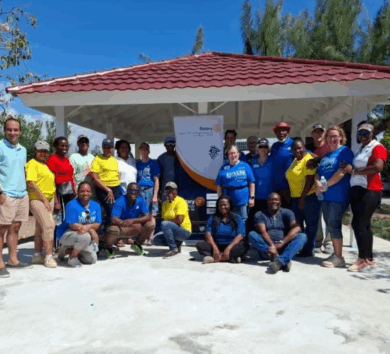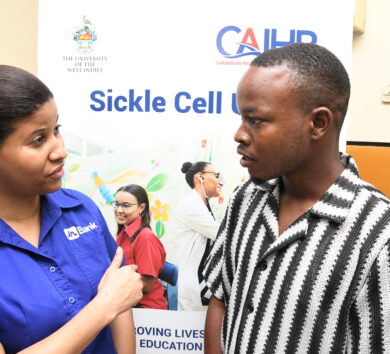

By Sasha-Gay Wright
Cancer remains one of the most pressing global health challenges, with prostate cancer being one of the leading causes of illness and death among men in the Caribbean. While modern medicine has advanced significantly, scientists are increasingly turning to nature for new treatment options. This is particularly relevant in the Caribbean, where prostate cancer tends to be more aggressive in men of African descent.
Many of today’s chemotherapy drugs originate from plants, highlighting nature’s critical role in cancer treatment. The region’s rich biodiversity holds immense potential for discovering novel cancer-fighting compounds. By exploring how these natural compounds interact with cancer cells, researchers aim to develop plant-based therapies that could be more precise and less toxic than conventional treatments.
Medicinal Plants in Cancer Research: A Historical Perspective
The idea of using plants to treat diseases is not new. For centuries, traditional healers have relied on herbs and plant extracts to manage various ailments. Modern medicine has validated some of these remedies, leading to the discovery of drugs such as paclitaxel (from the Pacific yew tree) and vinblastine (from the Madagascar periwinkle), both of which are essential in cancer treatment.

In the Caribbean, indigenous communities have long used plants like soursop (Annona muricata), turmeric, and guinea hen weed (Petiveria alliacea) for their purported anticancer effects. Scientists are working to understand the molecular mechanisms behind these traditional remedies to determine whether they hold real promise for cancer therapy.
How Plant Compounds Work Against Cancer
Natural plant-derived compounds can fight cancer in several ways:
- Blocking Cell Growth – Some plant compounds interfere with the cell cycle, preventing cancer cells from multiplying uncontrollably.
- Inducing Apoptosis (Cell Death) – Certain bioactive molecules can trigger programmed cell death in cancer cells while sparing healthy ones.
- Preventing Metastasis – Some plant extracts have been found to reduce the ability of cancer cells to spread to other parts of the body.
- Enhancing the Immune System – Certain phytochemicals boost the immune response, helping the body recognize and destroy cancer cells.
Other Promising Caribbean Plants in Cancer Research
Caribbean plants have shown great potential in cancer research:
- Yellow, white and purple yams (Dioscorea spp.) – Rich in certain fatty acids and anthocyanins associated with cell death, cell cycle arrest and inhibition of cell migration in prostate cancer cells while having minimal impacts on normal cells.
- Soursop (Annona muricata) – This plant contains acetogenins, which have shown promise in causing cancer cells to die.
- Guinea Hen Weed (Petiveria alliacea) – Traditionally used in herbal medicine, studies suggest it has cytotoxic effects against certain cancer cell lines.
- Turmeric (Curcuma longa) – Contains curcumin, which has been widely researched for its anti-inflammatory and anticancer properties.
- Neem (Azadirachta indica) – Known for its immune-boosting effects, neem extracts have been found to inhibit the growth of cancer cells in laboratory studies.
- Ball Moss (Tillandsia recurvata) – Preliminary studies suggest that this plant may contain compounds that induce cell death in cancer cells.
Challenges and Future Directions
Despite the promising potential of plant-based cancer treatments, several challenges remain. One major hurdle is the need for rigorous scientific validation. While traditional knowledge provides valuable clues, clinical trials are necessary to determine the safety and efficacy of these compounds in humans.
Another challenge is accessibility. Even if a plant-based treatment is proven effective, developing it into a standardized, widely available drug takes time and significant investment. The Caribbean must invest in local research infrastructure to ensure that its natural resources are studied and developed into viable medical solutions rather than being exploited by foreign entities.
Why Homemade preparations don’t work
Sometimes, natural plant products don’t work as well in everyday preparations as they do in scientific studies. This can happen for a few reasons. First, the way plants are prepared can affect the effectiveness of the compounds inside. For example, boiling or drying a plant might change its chemical structure, making it less effective or even inactive.
Another issue is that plant compounds may be more effective when concentrated or combined with other compounds. For instance, in traditional medicine, plants are often used in specific combinations, but it’s not always clear which parts of the plant or which combinations are the most effective. In addition, when using plants for medical treatment, the right dosage is very important, and this can be hard to determine from traditional methods.
The Role of Collaboration in Natural Product Research
Addressing these challenges requires collaboration between scientists, policymakers, and local communities. Universities and research institutions in the Caribbean must work with international partners to advance cancer research while ensuring that benefits remain within the region. Funding and support for clinical trials, patents, and pharmaceutical development are crucial to bringing natural plant-based treatments from the lab to the clinic.
Furthermore, public education is essential. While natural remedies hold promise, not all herbal treatments are effective or safe. Promoting evidence-based discussions about natural products in cancer treatment will help ensure that patients make informed health decisions.
Future of Plant-Based Cancer Research
The future of plant-based cancer research is becoming increasingly promising with advancements in AI, biotechnology, and molecular docking techniques. Plants have long been a source of therapeutic compounds, but discovering new plant-derived molecules can be slow and labor-intensive. AI is now playing a pivotal role in accelerating this process by enabling rapid analysis of plant genomes, chemical profiles, and bioactivity data. Machine learning algorithms can predict which plant compounds might have anti-cancer properties, allowing researchers to focus on the most promising candidates.
Molecular docking also plays a critical role in this field by simulating how plant-derived compounds interact with cancer-related proteins. This computational technique helps identify the binding affinity of potential drug candidates, providing insights into their mechanisms of action. Biotechnology further enhances these efforts through genetic engineering and synthetic biology to optimize the production of bioactive molecules at a larger scale. Together, AI, molecular docking, and biotechnology have the potential to revolutionize cancer treatment by accelerating drug discovery and offering sustainable, affordable options for patients.
The Caribbean’s rich biodiversity offers a wealth of potential solutions in the fight against cancer. By combining traditional knowledge with modern scientific techniques, researchers can uncover new, plant-based therapies that may complement existing treatments. With continued investment and collaboration, nature could hold the key to the next breakthrough in prostate cancer treatment, offering hope to patients in Jamaica, the Caribbean, and beyond.
As research progresses, one thing is clear: the power of nature is still being unlocked, and the Caribbean has an important role to play in this global scientific journey.







Comments